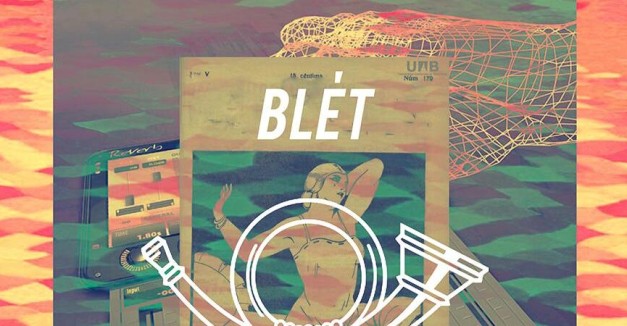For blét’s Joe Kozal, music is about exploration and the ability to discover and express different feelings.
That often takes time and patience; which might be why blét leaves so much space in their sound. Their music is sometimes sweet and soft, but maintains a forward momentum familiar to alternative rock ensembles, all while maintaining a certain ambience.
Expect to hear those lush sounds waft down O Street when blét performs for Hear Lincoln this Friday at noon.
Along with Friday’s set outside of Wells Fargo, blét will be performing at the HN-sponsored Maha showcase at The Bourbon next week on July 23 with Bogusman and A Ferocious Jungle Cat. RSVP to the show here.
If you missed it, blét sat down with last winter on Hear Nebraska FM to chat about their debut EP, Uncles, their past history in hardcore bands and their love for experimenting with sounds via guitar pedals.
Kozal expands on this and more below, and Cole Keeton and Spencer McCoy weigh in on fond musical memories from their childhood.
Hear Nebraska: What was your first ever show in a real band like?
Joe Kozal: My first show was in my hometown (Scottsbluff, NE), where the public library put on a battle of the bands. Spencer’s (McCoy, also from Scottsbluff) first band started out there, as well. Those shows always provided a really strange mix of kids. About half were there for loud music, but wanted nothing to do with books, and the other half were bookish introverts who probably didn’t want to find themselves in the throes of a mosh pit. Cole’s (Keeton) first show was a similar experience, but it was in a gymnasium at St. Patrick’s youth center in Sidney, instead of a public library.
HN: How was that group different than blét? How have you changed?
JK: There was a brief little scene in western Nebraska circa 2006 that was almost entirely comprised of metal/hardcore/punk bands. The unfortunate thing about that was the disconnect between what kids in bands wanted to play and what everyone else wanted to hear.
Since then, I think we’ve all come to the important realization that music provides so many avenues to explore different moods and emotions. The aggression at the center of the styles we used to play doesn’t always lend itself to that exploration, not to mention how exhausting it is to play.
HN: What’s your earliest musical memory?
JK: When my older brother was learning to play the guitar, he would always play “Hang On Sloopy” by The McCoys (not related to my bandmate). I was probably two or three years old, and I misheard the lyrics. I would always ask him to play the “Snoopy” song and think he was singing about a cartoon dog. He was always a good sport about it, and I remember really liking that someone would sing a song just for me. That’s a nice thing to do for someone else.
Cole Keeton: My first musical memory is when my dad asked me to clap along while he played Woody Guthrie’s “Froggie Went a Courtin’.” I was really receptive to folk songs early on. Simple song structures and vivid storytelling are really good avenues for kids to connect with music.
Spencer McCoy: My dad would turn on the classic rock radio station and quiz me on who was playing what song. When I’d get one wrong he’d playfully shout, “Awww, c’mon.” One time I thought ZZ Top was Led Zepplin. I deserved the “Aww, C’mon.”
HN: How do you see the relationship between Lincoln’s creative and the business community?
JK: This is a pretty exciting time to be living in Lincoln. With all the expansion that’s been happening, including the addition of new music venues, I think some people really understand there’s a lot of opportunity that comes with cooperation between the two camps. A lot of Lincoln’s best culture is becoming more accessible.
HN: Would you guys ever consider adding a drummer to the group?
JK: We won’t say we’ll never have a drummer, but we have developed a pretty comfortable dynamic with just the three of us. The absence of a drummer has definitely been a huge influence on how we write our songs. We developed our current setup out of necessity.
In a lot of art, the medium or process is a huge factor in determining the final product and that’s no different in music. We also enjoy the restraint that comes from basing drums parts purely off necessity. Our drummer never overplays.
HN: “Dream pop” is often used to describe Blét’s sound, so what sort of dreams should people have?
JK: People should dream of a world where The Eagles don’t hate each other, and The Wallflowers never covered Bowie’s “Heroes” for the shitty 1998 Godzilla remake.
HN: How important is space to your music?
JK: Our goal is to write dynamic songs, and space is one of the best tools we’ve found help us do that. It allows us to create more layers than we could otherwise.
HN: Do you feel that’s a musical technique that’s difficult to master?
JK: It definitely requires you to rethink how you play an instrument, specifically the number of notes you hit. We’ve all had to restrain ourselves more than we anticipated originally. It’s important to let each part breathe in the space it requires, which, in turn, puts more emphasis on the proper placement of the notes you do play. With all that said, we certainly wouldn’t claim to have mastered it.




